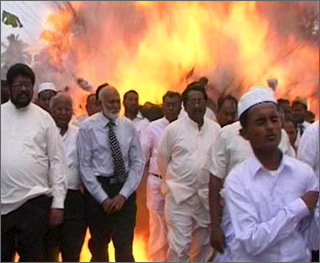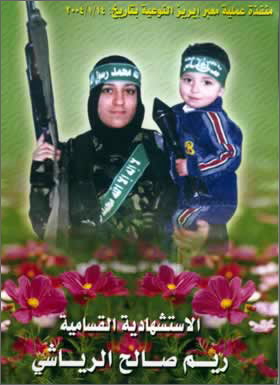Why Do Terrorists Blow Themselves Up?
Why Do Terrorists Blow Themselves Up?

ADELAIDE: Nine years ago, 19 young Muslims commandeered passenger jets and killed themselves, taking with them 2973 people to the inferno of fire. Since the 9/11 attacks suicide bombings have become a staple of daily news, although the practice dates back at least two decades. A commonly accepted narrative frames such acts of self-destruction as the action of psychologically impaired, morally deficient, uneducated, impoverished individuals and, most of all, religious fanatics.
But the analysis of information based on 1597 suicide attacks between 1981 and 2008, which killed more than 21,000 in 34 countries, suggests a more complex set of reasons, an understanding of which is essential if the world is to see an end of such slaughter. My book, “Life as a Weapon,” analyzes suicide bombings as a method of choice among terrorist groups around the world and the motivations.
Surprisingly, altruism emerges as a major factor in the complex set of causes behind the suicide attacks.
In its most fundamental character, following the seminal studies of economist Ernest Fehr and colleagues, altruism can be defined as the costly actions that confer benefits on other individuals. Altruism is a fundamental condition accounting for human cooperation for organization of society and its cohesiveness. In the conceptual map of French sociologist Emile Durkheim, suicide bombings would fall in the category of altruistic suicidal actions – distinct from other types of suicidal actions caused by personal catastrophes, hopelessness and psychopathologies that lead people to believe life is not worth living. Altruistic suicides, on the other hand, involve valuing one’s life as less worthy than the group’s honor, religion or other collective interests.
The genesis of suicide bombings is rooted in intractable asymmetrical conflicts pitching the state against non-state actors over political entitlements, territorial occupation and dispossession. Invariably such conflicts instigate state-sanctioned violence and repressive policies against weaker non-state parties causing widespread outrage and large-scale dislocation of people, many of whom become refugees in makeshift camps, in or outside so-called war zones.

Carolyn Nordstrom captures the mood in Sri Lanka during the recently ended civil war: “In the war zones, violence and war permeated all aspect of daily life. It was not certain a person going for work would return in the evening. A home could be suddenly searched, someone brutally killed, a mother raped or father taken away. A shell could land anywhere destroying everything around.…This kind of pervasive atmosphere of violence, rather than breaking down the resistance and spirit of population, in times creates resistance and defiance, particularly in the youth.” Other contributing factors include incarceration and dehumanizing treatments of insurgents in state custody and mutual dehumanization of the “other.”
Suicide bombing, rarely the strategy of first choice, is selected by terrorist organizations after collective assessments, based on observations and experience, of strategies’ relative effectiveness to achieve political goals. The decision to participate is facilitated by suicide bombers’ internalized social identities, their exposure to asymmetric conflict and its costs, their exposure to organizations that sponsor such attacks as well as membership in a larger community where sacrifice and martyrdom carry high symbolic significance. In Sri Lanka, the Black Tigers attached importance to how the community would view their actions: They were glorified in their burial rituals, and an eternal lamp adorned the tombstone of every Black Tiger grave to commemorate the sacrifice.
From sociological and economic perspectives, suicide bombings can be linked to altruism as a form of intergenerational investment or an extreme form of saving in which the agent gives up current consumption for the sake of enhancing probability of descendants enjoying benefit of some future public good.
Analysis of Hezbollah suicide bombers in Lebanon shows that incidents of suicide bombing attacks increase with current income and the degree of altruism towards the next generation. Hezbollah suicide bombers come from above-average wealthy families and have above-average levels of education. The willingness of more educated people to engage in suicide missions suggests that education affects one’s view of the world, enhancing sensitivity to the future.
Altruism is not antithetical to aggression. In war soldiers perform altruistic actions by risking lives for comrades and country and also killing the enemy. Actions of Japanese kamikaze pilots in World War II are examples of military sacrifice.
Altruism can also be socially constructed in communities that have endured massive social and economic dislocations as a result of long, violent and painful conflict with a more powerful enemy. Under such conditions people react to perceived inferiority and the failure of other efforts by valuing and supporting ideals of self-sacrifice such as suicide bombing. Religiously and nationalistically coded attitudes towards acceptance of death stemming from long periods of collective suffering, humiliation and powerlessness enable political organizations to give people suicide bombing as an outlet for feelings of desperation, deprivation, hostility and injustice.
The evidence, however, also shows that such personal and collective sufferings motivating suicide bombers coexist with their inner feelings of altruism and sense of fairness. An Iraqi suicide bomber Marwan prayed that “no innocent people were killed in his mission.” Shafiqa, an incarcerated failed Palestinian suicide bomber in Israel, did not detonate her device after seeing “a woman with a little baby in her carriage. And I thought, why do I have to do this to that woman and her child?... I won’t be doing something good for Allah. I thought about the people who loved me and about the innocent people in the street…It was a very difficult moment for me.”
French filmmaker Pierre Rehov interviewed many Palestinians in Israeli jails, arrested following failed suicide-bombing missions or for aiding and abetting such missions, for his film “Suicide Killers.” Every one of them tried to convince him that that the action was the right thing to do for moralistic reasons. According to Rehove, “these aren’t kids who want to do evil. These are kids who want to do good….” The result – young people who had previously conducted their lives as good people believe that a suicide bombing represented doing something great.
Everyday degradations of Israeli occupation had created collective hatred, making them susceptible to indoctrination to become martyrs. As Stanford University psychologist Philip Zimbardo puts it, “It is neither mindless nor senseless, only a very different mind-set and with different sensibilities than we have been used to witnessing among young adults in most countries.”
Suicide bombings invariably provoke a brutal response from authorities. By injecting fear and mayhem into ordinary rhythms of daily life, such bombings undermine the state’s authority in providing security and maintaining social order. Under such conditions the state can legitimately impose altruistic punishments to deter future violation threatening security and social order. These include punishments meted out to perpetrators and their supporters. The state-sanctioned military actions against the Palestinians, Sri Lankan Tamil Tigers, Iraqi insurgents and the Taliban in Pakistan and Afghanistan are examples of these punishments.
But altruistic punishments are only effective when they do not violate the norms of fairness. Punishments and sanctions seen as unfair, hostile, selfish and vindictive by targeted groups tend to have detrimental effects. Instead of promoting compliance, they reinforce recipients’ resolve to non-compliance. Counter-insurgency operations are aimed at increasing the cost of insurgency to the insurgents, and invariably involve eliminating leaders and supporters who plan suicide bombings, destroying insurgents’ capabilities for mounting future attacks, and restrictions on mobility and other violations of civil liberties.
But there is mounting evidence that such harsh measures reinforce radical opposition and even intensify it. This is now happening in Pakistan, Afghanistan and the Palestinian territories and has also been the case in Sri Lanka and Iraq and other conflict sites.
Comments
I find it very hard to see why these young people even in these harsh conditions do not see the value of their own lives the message we should be sending them is life is too precious to hurt others instead use your lives to do the good that you want everyone to notice you for achieving greatness takes time destroying it is a utter and complete waste nothing but more pain and suffering will be the title of your so called achieviments radical or uneducated doesn't matter if you are human then you know the difference between right and wrong trying to justify the choices that we make are always the intent to try and convince ourselves that we are doing right but knowingly we are intentionally doing the wrong thing. Internalizing this hate can only die with our better views on how we as people should carry on with our lives. Love, Laugh , Repeat...
Eric, I suspect that it is difficult to share the same outlook on life when you or your community are exposed to living and dying in a war zone.